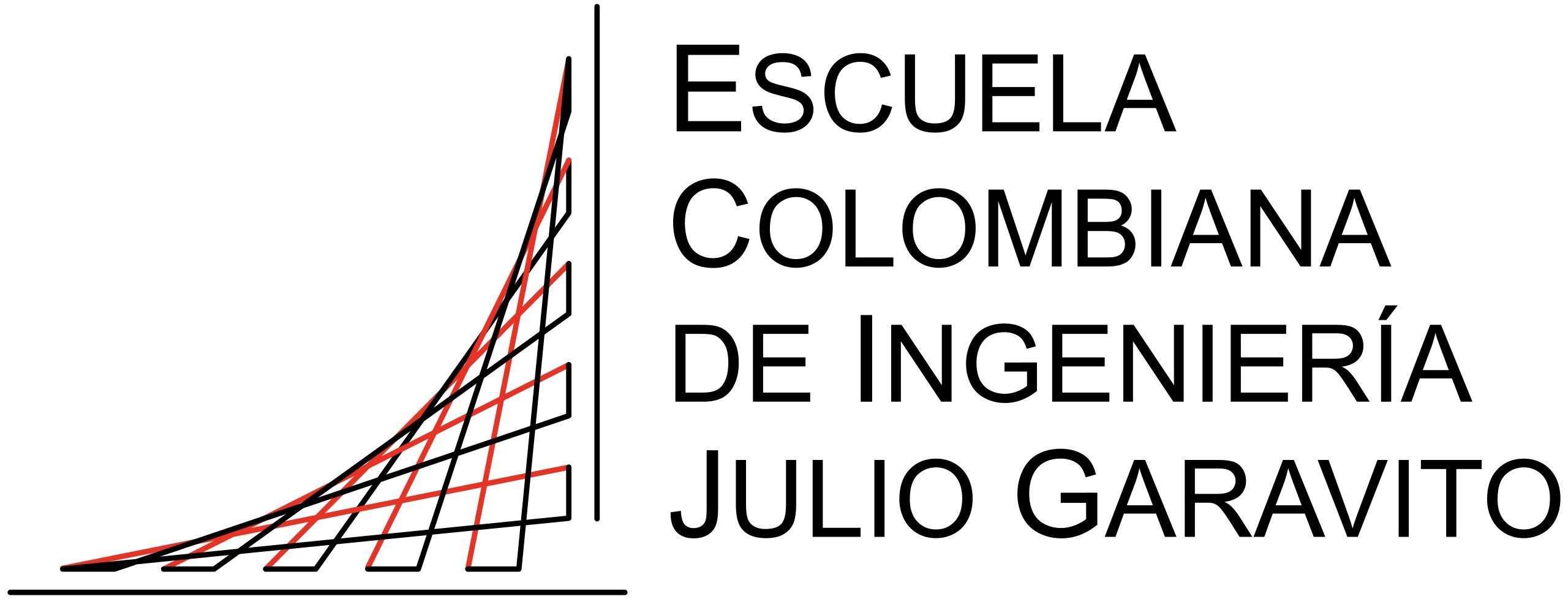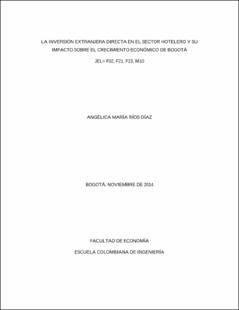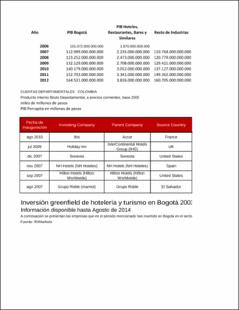| dc.contributor.advisor | Torres Salamanca, Raul (dir) | spa |
| dc.contributor.author | Ríos Díaz, Angélica María | spa |
| dc.date.accessioned | 2015-02-16T17:53:27Z | spa |
| dc.date.accessioned | 2021-10-01T14:25:31Z | |
| dc.date.available | 2015-02-16T17:53:27Z | spa |
| dc.date.available | 2021-10-01T14:25:31Z | |
| dc.date.issued | 2014 | spa |
| dc.identifier.uri | http://catalogo.escuelaing.edu.co/cgi-bin/koha/opac-detail.pl?biblionumber=17454 | spa |
| dc.identifier.uri | https://repositorio.escuelaing.edu.co/handle/001/171 | |
| dc.description.abstract | The present thesis seeks to show through the sector hotels, restaurants, bars and similar, that: direct foreign investment (FDI) in hotels had a positive impact on the growth of the product of Bogotá through the measurement technique of Ivanov and Webster (2007) modified during the 2007-2012 period.
In order to carry out this verification, part of the role of FDI in the growth of GDP of the sector and the city, a role that is taken as proper to the relationship established in the Solow model between investment and economic growth , besides highlighting the effects of the arrival of FDI through the externalities that it produces through the analysis of the factors that have driven it in the hotel sector of Bogotá, in such a way that its impact on the economic growth of the city is highlighted. city through the evolution of the growth of the hotels, restaurants, bars and similar sector; It is considered that this investment is the access route that allows Bogotá to join the international tourism networks, as it enhances its competitiveness as a tourist destination and promotes the influx of foreign tourists, who take as a frame of reference the support that They offer international hotel chains when making their choice.
So, the importance of this study lies in the realization of an ex post analysis of the impact of FDI on hotels that brought with it the arrival of the international hotel chains Holiday Inn, Ibis, NH Hotels, Marriot, JW Marriot, Hilton and Sonesta to Bogotá by means of the quantification of the contribution of the hotels, restaurants, bars and similar sector in the economic growth of the city. This in order to evaluate if the new IED in hotels was important at the time of positioning Bogota within the international tourism networks, making it more competitive as an international destination and increasing the influx of foreign tourists to the city in the 2007- 2012
The thesis begins with the definition of the sector hotels, restaurants, bars and similar and tourism, describing the link of this sector with tourism development and its importance in economic growth. In the second chapter, we present the theoretical framework used based on the Solow growth model and the importance of FDI in economic growth according to Borensztein; in addition to an analysis of the determinants of the increase of FDI in Colombia and in the hotel sector based on the evolution of the country as an international tourist destination and its improvements in terms of risk and security, among other situations that explain the country's positioning abroad and Bogotá as a preferred destination for foreign tourists arriving in Colombia. The third chapter describes the model to be used, which is a modification of the methodology presented by Ivanov and Webster (2007) focused on measuring the direct effects of tourism on economic growth. Finally, the fourth chapter carries out the analysis of the link between FDI, the increase in the influx of foreign tourists and the quantification of the contribution of the hotels, restaurants, bars and similar sector within the growth of the city's product through of the importance of the new FDI in Bogota hotels in the analyzed period. The thesis concludes that FDI in hotels has been a factor in promoting the growth of tourism in Bogota and has had a positive impact on the economic growth of the city in the period analyzed. | eng |
| dc.description.abstract | El presente trabajo de tesis busca mostrar por medio del sector hoteles, restaurantes, bares y similares, que: la inversión extranjera directa (IED) en hoteles tuvo un impacto positivo sobre el crecimiento del producto de Bogotá a través de la técnica de medición de Ivanov y Webster (2007) modificado durante el periodo 2007-2012.
Con el propósito de llevar a cabo dicha comprobación, se parte del papel que cumple la IED en el crecimiento del PIB del sector y de la ciudad, papel que se toma como propio de la relación establecida en el modelo de Solow entre inversión y crecimiento económico, además de destacar los efectos de la llegada de IED a través de las externalidades que produce por medio del análisis de los factores que la han impulsado en el sector hotelero de Bogotá, de tal modo que se resalta su impacto en el crecimiento económico de la ciudad a través de la evolución del crecimiento del sector hoteles, restaurantes, bares y similares; pues se considera que esta inversión es la vía de acceso que le permite a Bogotá incorporarse en las redes internacionales de turismo, ya que potencializa su competitividad como destino turístico y promueve la afluencia de turistas extranjeros, los cuales toman como marco de referencia el respaldo que ofrecen las cadenas hoteleras internacionales a la hora de hacer su elección.
De modo que, la importancia de este estudio radica en la realización de un análisis ex post del impacto de la IED en hoteles que trajo consigo la llegada de las cadenas hoteleras internacionales Holiday Inn, Ibis, NH Hotels, Marriot, JW Marriot, Hilton y Sonesta a Bogotá por medio de la cuantificación de la contribución del sector hoteles, restaurantes, bares y similares en el crecimiento económico de la ciudad. Esto con el fin de evaluar si la nueva IED en hoteles fue importante a la hora de posicionar a Bogotá dentro de las redes internacionales del turismo, haciéndola más competitiva como destino internacional y aumentando la afluencia de turistas extranjeros a la ciudad en el periodo 2007-2012.
La tesis inicia con la definición del sector hoteles, restaurantes, bares y similares y el turismo, describiendo el vínculo de este sector con el desarrollo turístico y su importancia en el crecimiento económico. En el segundo capítulo, se expone el marco teórico utilizado partiendo del modelo de crecimiento de Solow y de la importancia de la IED en el crecimiento económico de acuerdo con Borensztein; además de realizar un análisis de los determinantes del aumento de la IED en Colombia y en el sector hotelero partiendo de la evolución del país como destino turístico internacional y sus mejoras en términos de riesgo y de seguridad, entre otras situaciones que explican el posicionamiento del país en el exterior y de Bogotá como destino preferido para los turistas extranjeros que llegan a Colombia. En el tercer capítulo se describe el modelo a utilizar, el cual es una modificación de la metodología presentada por Ivanov y Webster (2007) enfocada a medir los efectos directos del turismo en el crecimiento económico. Por último, el cuarto capítulo lleva a cabo el análisis del vínculo entre la IED, el aumento de la afluencia de turistas extranjeros y la cuantificación de la contribución del sector hoteles, restaurantes, bares y similares dentro del crecimiento del producto de la ciudad por medio de la importancia de la nueva IED en hoteles de Bogotá en el periodo analizado. La tesis termina concluyendo que la IED en hoteles ha sido un factor de promoción del crecimiento del turismo en Bogotá y ha tenido un impacto positivo sobre el crecimiento económico de la ciudad en el periodo analizado. | spa |
| dc.format.mimetype | application/pdf | spa |
| dc.language.iso | spa | spa |
| dc.publisher | Escuela Colombiana de Ingeniería Julio Garavito | spa |
| dc.rights | Derechos Reservados - Escuela Colombiana de Ingeniería Julio Garavito | spa |
| dc.rights.uri | https://creativecommons.org/licenses/by-nc/4.0/ | spa |
| dc.subject | Hoteles | spa |
| dc.subject | Sectores productivos | spa |
| dc.subject | Inversiones extranjeras | spa |
| dc.subject | Economia | spa |
| dc.title | La inversión extranjera directa en el sector hotelero y su impacto sobre el crecimiento económico de Bogotá | spa |
| dc.type | Trabajo de grado - Pregrado | spa |
| dc.type.version | info:eu-repo/semantics/publishedVersion | spa |
| oaire.accessrights | http://purl.org/coar/access_right/c_14cb | spa |
| oaire.version | http://purl.org/coar/version/c_970fb48d4fbd8a85 | spa |
| dc.description.degreelevel | Pregrado | spa |
| dc.description.degreename | Economista | spa |
| dc.publisher.program | Economía | spa |
| dc.rights.accessrights | info:eu-repo/semantics/closedAccess | spa |
| dc.rights.creativecommons | Atribución-NoComercial 4.0 Internacional (CC BY-NC 4.0) | spa |
| dc.type.coar | http://purl.org/coar/resource_type/c_7a1f | spa |
| dc.type.content | Text | spa |
| dc.type.driver | info:eu-repo/semantics/bachelorThesis | spa |
| dc.type.redcol | http://purl.org/redcol/resource_type/TP | spa |
| dc.subject.keywords | Hotels | spa |
| dc.subject.keywords | Foreign investments | spa |
| dc.subject.keywords | Productive sectors | spa |
| dc.subject.keywords | Economy | spa |












